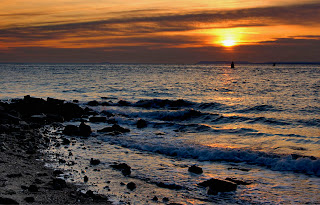"...The world and its enticement are passing away. But whoever does the will of God remains forever."
Each of us has favorite stories we love to hear over and over again. One of mine is the story of Simeon and Anna, the two old people who figure in the presentation of the baby Jesus in the Temple in Luke's Gospel. God had promised Simeon that he would see the Messiah; Anna, a prophetess, spends all her time in the Temple and, when she sees Jesus with his parents, tells everyone about the baby.
Simeon and Anna, two senior saints. What's remarkable, what really distinguishes them as holy people, is their complete openness to what is truly, fundamentally important in life and to embracing it on its own terms and not on rigid terms of their own making. They embrace the Divine just as they find it--and then reach out to extend it to others. How many "Simeons" in today's secular, consumerist society would turn away in disappointment when the Messiah turned out to be a helpless baby instead of a great lord who arrives in a splash of pomp and, of course, throws a reception with plenty of free food and drink? How many "Annas" would be deaf to the prophetic word unless it were uttered by a TV talk-show host?
Then there are the real Simeons and Annas that it's our privilege to know. A friend of mine who, at the age of 76, is passionately involved in local politics to help make his township a better place. My Swedish sister-in-law who, even after she lost most of her eyesight in her eighties, continued in a "Senior Dance" group that went around and entertained those confined by age and disability to nursing homes. And little Carmela, who had no family but whose funeral, when she died in her mid-eighties, packed a large Long Island church to the rafters because she unfailingly reached out to others in loving and caring ways, doing kind things or simply asking people about their families and ensuring them that she prayed for them.
On January 1 the first members of the "Boomer" generation will begin to turn sixty-five. Simeon and Anna stand as role models and, indeed, as signs of hope, that seniorhood needn't and shouldn't mean rolling in the sidewalks of one's life. Embracing the Divine means feeding the hungry, not waiting around to be fed; it means engaging with real people and not losing oneself in a world populated by TV and film stars. But then, that's a challenge issued to all of us, regardless of our age.


















